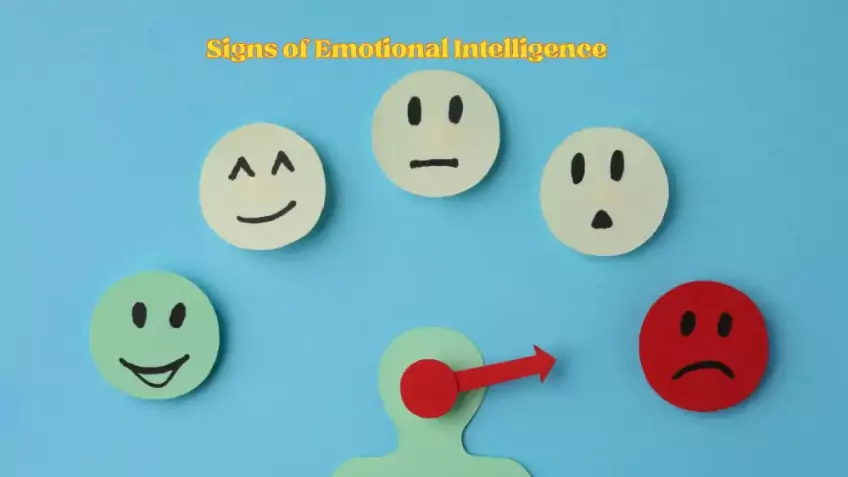7 signs of emotional intelligence
Understanding and controlling our own emotions as well as other people’s emotions has become an important skill for both personal and business success. This skill, called emotional intelligence, has gotten a lot of attention because it affects many parts of our lives.
We’ll talk about the idea of emotional intelligence and why it’s important in our personal and professional lives in this article.
What is emotional intelligence?
Knowing how to understand and control your own feelings and the emotions of others is what emotional intelligence is all about. It means being aware of how we feel, controlling how we respond, and understanding how other people feel. Skills like self-awareness, self-control, motivation, kindness, and social skills are also part of it.
Emotional intelligence helps us deal with stress, get along with others, and be successful in many parts of our lives. When we are emotionally clever, we can talk to other people clearly, make strong connections with them, and deal with problems in a healthy way. Better self-awareness helps us make smarter choices and adjust to new situations.
To put it simply, emotional intelligence means being aware of your feelings, dealing with them in a healthy way, knowing how others feel, and making healthy connections with others

Emotional intelligence in personal and professional success
Emotional intelligence helps people be more successful in their personal and professional lives by improving their self-awareness, self-control, understanding, communication, relationship building, leadership, flexibility, and toughness. People can learn more about themselves and others, make smarter choices, make strong connections, and handle the challenges of personal and work life more easily.
There are several important ways that emotional intelligence is important for both personal and career success:
Knowing yourself
Emotional intelligence helps people know their own feelings, strengths, weaknesses, and beliefs. Being aware of who they are lets them make choices that are in line with their values and goals, which gives them a sense of purpose and satisfaction.
Self-regulation
People with high emotional intelligence can deal with stress, stop acting on impulse, and keep a positive attitude by successfully managing their feelings. Being able to control themselves helps them stay focused, make smart choices, and keep going even when things get tough, all of which are important skills for success in both personal and business life.
Empathy and Relationship Building
Being able to understand and connect with other people’s feelings and build strong relationships are all parts of emotional intelligence. These skills are very important in personal relationships because they help build trust, connection, and support. In the workplace, empathy and building relationships help people work together, drive and inspire others, and collaborate.
Communication and Resolution of Conflicts
Emotional intelligence improves communication skills, such as the ability to actively listen, read body language, and say what you want to say. People can deal with disagreements and conflicts with empathy and understanding, which leads to better answers and stronger relationships.
Influence and Leadership
Emotional intelligence is closely linked to being a good leader. Leaders who are emotionally intelligent can encourage and motivate their teams, know what they need and meet it, and make the workplace a good place to be. They can also change how they lead depending on the person or the situation, which makes their employees happier and more productive.
Adaptability and resilience
Emotional intelligence helps people deal with change, setbacks, and failures by helping them react to them. It encourages a growth attitude, which lets people see problems as chances to learn and grow. People with this kind of adaptability and resilience can do well in settings that are complicated and change quickly.
Developing Emotional Intelligence
By using these strategies regularly, people can build and improve their emotional intelligence, which can lead to better relationships, more success at work, and better health in general.
Developing emotional intelligence is an ongoing process that can be cultivated and strengthened over time. Here are strategies to enhance each of the seven signs of emotional intelligence:

1. Self-awareness:
- Practice mindfulness: Set aside time for self-reflection and observe your thoughts, emotions, and reactions without judgment.
- Seek feedback: Ask trusted friends, family members, or colleagues for honest feedback about your strengths and areas for improvement.
- Keep a journal: Write down your thoughts and emotions regularly to gain deeper insight into your patterns and triggers.
2. Self-regulation:
- Identify triggers: Recognize the situations or events that tend to elicit strong emotional responses, and develop strategies to manage them effectively.
- Practice stress management techniques: Engage in activities like exercise, deep breathing, meditation, or engaging in hobbies to reduce stress and manage emotions.
- Develop impulse control: Pause before responding to a situation, allowing yourself time to choose a thoughtful and appropriate response.
3. Motivation:
- Set meaningful goals: Identify goals that align with your values and aspirations, providing a sense of purpose and motivation.
- Break goals into smaller steps: Divide larger goals into smaller achievable tasks to maintain a sense of progress and motivation.
- Celebrate successes: Acknowledge and reward yourself for achieving milestones along the way to maintain motivation and drive.
4. Empathy:
- Practice active listening: Give your full attention to others, listen without interruption, and try to understand their perspective.
- Put yourself in others’ shoes: Try to imagine how others might be feeling in a given situation and consider their emotions and needs.
- Cultivate compassion: Show kindness, understanding, and empathy towards others, even when you may not fully agree or understand their experiences.
5. Social skills:
- Develop effective communication: Practice clear and assertive communication, paying attention to verbal and nonverbal cues.
- Build rapport: Seek genuine connections with others, show interest, and engage in active conversations.
- Collaborate and cooperate: Foster teamwork, be open to different perspectives, and work towards win-win solutions.
6. Adaptability:
- Embrace change: Develop a flexible mindset and view challenges as opportunities for growth and learning.
- Cultivate resilience: Learn from failures and setbacks, bounce back, and maintain a positive attitude.
- Seek new experiences: Step out of your comfort zone, try new things, and expose yourself to diverse perspectives and situations.
7. Emotional intelligence in leadership:
- Lead by example: Demonstrate emotional intelligence in your own actions and behaviors, inspiring others to do the same.
- Provide feedback and support: Offer constructive feedback, mentorship, and support to help others enhance their emotional intelligence.
- Foster a positive work environment: Create an inclusive and supportive atmosphere that values emotional well-being and open communication.
Emotional Intelligence in Leadership
Good leaders know how important emotional intelligence is and work to improve these seven signs. Leaders who use emotional intelligence can inspire and motivate their teams, build strong relationships, deal with problems, and make the business as a whole successful.
Here are the seven signs of emotional intelligence impact effective leadership:
Self-awareness
- Helps leaders understand their emotions, strengths, and weaknesses
- Enables leaders to recognize their impact on others and adjust their behavior accordingly
Self-regulation
- Allows leaders to manage their emotions and remain composed under pressure
- Helps leaders make decisions thoughtfully and avoid impulsive reactions
Motivation
- Drives leaders to set and achieve meaningful goals
- Inspires and motivates team members by creating a sense of purpose
Empathy
- Enables leaders to understand and relate to the emotions and perspectives of others
- Fosters trust, collaboration, and effective communication within the team
Social skills
- Facilitates strong communication, collaboration, and relationship-building
- Helps leaders create a positive and inclusive work environment
Adaptability
- Allows leaders to navigate change and uncertainty with resilience
- Encourages innovation and the ability to seize opportunities
Emotional intelligence in leadership
- Inspires trust and fosters a sense of psychological safety within the team
- Empowers team members and promotes a culture of growth and collaboration
In Conclusion,
Having strong emotional intelligence can make a big difference in our personal and work lives. We’ve looked at the seven signs of emotional intelligence and how they can help you be successful in this article.
We can learn more about ourselves, control our feelings, and stay focused on our goals if we work on self-awareness, self-regulation, and motivation. Social skills and empathy help us form strong bonds with others, talk to them clearly, and work together. Adaptability gives us the strength to deal with change and take advantage of chances.
You can reach your full potential, lead with compassion and authenticity, and make a positive difference in your personal and work life by accepting and practicing the seven signs of emotional intelligence.






